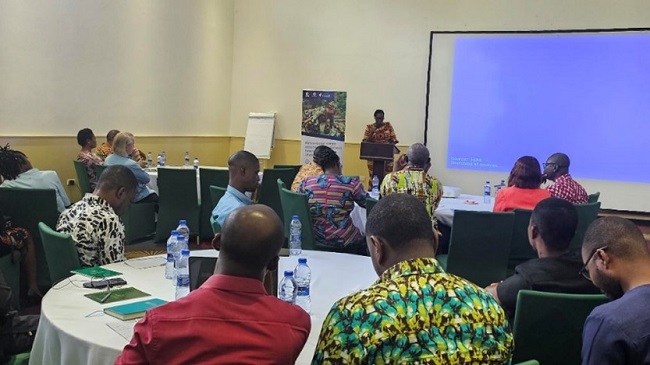Last month, a diverse group of stakeholders – including Ghanaian policymakers, members of the diplomatic corps, biodiversity conservation activists, experts in forestry, wildlife, water, and land management from public institutions, NGOs, civil society, academia, and the media – gathered in Accra, Ghana for a high-level policy dialogue on Nature-based Solutions (NbS).

Initially, NbS focused on actions like tree planting to rehabilitate degraded forest ecosystems. However, the concept has since evolved. Not all nature-related actions qualify as NbS – for instance, planting tree species that deplete underground water resources and disrupt the water cycle cannot be considered NbS.
Today, NbS is defined as actions that protect, sustainably manage, and restore ecosystems while effectively addressing societal challenges and improving human well-being. This approach, championed by the International Union for Conservation of Nature (IUCN) for over two decades, has gained global traction as a vital tool for climate adaptation, ecosystem restoration, and building community resilience.
This understanding informed the two-day high-level policy engagement to improve capacity of participants to mainstream NbS into national development planning and budgeting processes. It was organized by IUCN in partnership with the World University Service of Canada (WUSC).
In a statement, the Minister for Environment, Science and Technology (MEST), Ibrahim Murtala Muhammed, said the NbS project aligns with the national development objectives and is crucial in helping the country achieve its targets outlined in her Nationally Determined Contributions (NDCs) under the Paris Agreement.
The statement, which was read on his behalf by MEST’s Director in-charge of Environment, Dr. Peter Dery said the engagement was of national significance as it would contribute directly to the realization of the national and global targets.
On the matter of addressing climate change, biodiversity loss and ecosystem degradation, the Minister’s message specified that his Ministry’s priority was to incorporate NbS into the nation’s development framework in alignment with policies including Ghana’s National Land Policy and the National Climate Change Policy.
He also reaffirmed the government’s commitment to tackling environmental degradation through initiatives like the Tree for Life Reforestation Initiative, aimed at restoring millions of hectares of forest. This initiative is seen as central to enhancing biodiversity, combating climate change, and supporting local livelihoods.
NbS is at the core of the work of the Forestry Commission (FC), which manages about 3.6 million hectares – 15% of Ghana’s forest reserves and protected areas. FC’s Acting CEO, Huges Brown, noted that the Commission’s strategies and operations align with NbS principles and extend across the country, including off-reserve areas.
He cited key programmes such as the Ghana REDD+ Strategy (2016–2035) and the Forest Plantation Strategy (2016–2040), which are helping to protect and restore forests, while safeguarding communities and their livelihoods.
Touching on the significance of the high-level engagement, Country Director for WUSC in Ghana, Appiah Wiafe Adofo, said it provided an opportunity to critically examine the role of NbS in addressing social challenges while safeguarding biodiversity, ecosystem services, and overall ecosystem health in Ghana.
This is being done through the Nature-based Climate Adaptation in the Guinean Forests of West Africa’s Project (NbS Project) designed by IUCN, World Agroforestry, A Rocha Ghana and ABANTU for Development in collaboration with WUSC and the Canada based Centre for International Studies and Cooperation (CECI). This was in response to the significant climate change induced challenges including: reduced annual rainfall, rising local temperatures and frequent heatwaves, worsened by human-induced environmental degradation facing the project area, which is a globally significant biodiversity hotspot.
Appiah noted that since its inception in April 2023 in Ghana, Côte d’ivoire, and Guinea, the Project has seen a lot of progress especially in effective partnerships and meaningful stakeholder engagements with public-sector institutions at local and national levels as well as with civil society organizations working to promote environmental protection, biodiversity conservation and gender equality.
He said that, in Ghana, the team has collaborated closely with traditional authorities and over 50 women’s groups across 17 communities in the Bosomtwe and Wassa Amenfi landscapes in the Ashanti and Western Regions.
Key outcomes of the policy dialogue included identifying opportunities to integrate NbS into sector-specific policies. These include incorporating NbS into Ghana’s Riparian Buffer Zone Policy to promote inclusive water resource management and revising the National Water Policy to use NbS in addressing flood risks and coastal degradation. There was also broad support for expanding green infrastructure and urban green spaces as sustainable alternatives to conventional infrastructure.
Earlier, the technical capacities of 56 industry experts and policymakers were enhanced through an in-depth exploration of the NbS concept, its development process, and its foundational principles. A key component of this session was practical guidance on using the Self-Assessment Tool (SAT), which enables participants to determine whether case study initiatives qualify as NbS. Additionally, the tool empowers stakeholders to assess if projects truly represent nature-based solutions, ensuring the effectiveness and sustainability of NbS interventions.
By Ama Kudom-Agyemang
